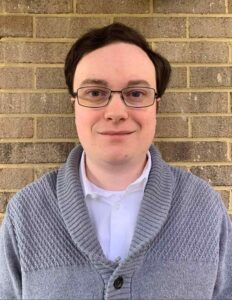John West is a Ph.D. candidate within the Department of Psychology and Neuroscience at the University of North Carolina at Chapel Hill. As he works to complete his dissertation — research that focuses on emotional granularity in individuals and how it shapes our memory — he has been awarded the Drs. Thomas and Sharon Watkins Summer Research Fellowship. The department is housed in the College of Arts & Sciences. He attended George Mason University, where he completed an honors thesis studying anxiety and memory.
Support graduate students like John
Q: Tell us about your research.
I have been interested in emotional memory for a long time – pretty much since my honors thesis. As I’ve gotten to know the literature more, one of the things I’ve noticed is it tends to be cognitive psychologists or memory researchers who are trained in cognitive psychology primarily conducting that research. So, it’s sort of an integration of two fields: research on memory and research on emotion. In general, those areas tend to proceed somewhat independently of one another.
Q: What will your summer funding allow you to do?
I have proposed my dissertation and I’m in the process of collecting data. So that’s what the summer fellowship has allowed me to really focus on. Without the funding, it would have been more difficult to graduate this year, because I would have presumably had to teach over the summer. Instead, I’ll now be able to devote more time to writing, collecting data and analyzing data.
Q: What does this funding mean to you?
First of all, it’s an honor to have that support. As I said, it really is very helpful and it’s going to allow me to pursue my research to the extent that I really would not have been able to pursue it had I been teaching. I’m also glad that they acknowledge the value of the research.
Q: What brought you to UNC-Chapel Hill?
I ended up choosing North Carolina based on the research that my mentor, Neil Mulligan, was doing. He studies memory – more specifically, basic second memories – and I was impressed by the research going on in North Carolina.
Q: There are so many different paths you can go on within the field of psychology. What sparked your interest in memory?
That’s a great question. Initially when I declared my major as psychology as an undergraduate, I thought I wanted to be a therapist, which is why I got involved with research on anxiety. My interest in memory started during my honors thesis. My mentor did a lot of work on the intersection of anxiety and different cognitive processes. The honors thesis he recommended I do dealt with the effects of anxiety on what participants remember about threatening information. I also had an honors professor who got me really interested in that realm, so I decided to go study it further in graduate school.
Q: What do you hope to accomplish after obtaining your degree?
I think what I’ve learned is that my biggest passion is conducting scientific and academic research. So that’s something I really enjoy. So broadly speaking, I want to continue doing that in some capacity, probably through a position that allows me to conduct research. I really like the freedom that academia affords you that maybe you don’t get in industry.
—Kate Slate
